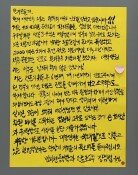ROK-U.S. alliance cannot stand without trust
ROK-U.S. alliance cannot stand without trust
Posted August. 15, 2017 07:16,
Updated August. 15, 2017 07:27
President Moon Jae-in met Monday with U.S. Chairman of the Joint Chiefs Staff Joseph Dunford. Chairman Dunford has said the military options have been prepared against North Korea only for when diplomatic and economic sanctions fail.
“Peace is fully aligned with South Korea’s national interests. We can never accept another war on the Korean peninsula,” said President Moon during a meeting with his senior secretaries, stressing that North Korea’s nuclear program must be resolved in a peaceful manner at any cost.
The last time President Moon made a public statement on North Korea’s nuclear and missiles programs was a week ago on Aug. 7, when he had a phone call with U.S. President Donald Trump.
During the meeting with his senior secretaries on Monday, the president did not mention such words as “sanctions” or “pressure," which the U.S. has continued to use with a great emphasis in addressing North Korean issues. Instead, he used the words “peace” and “must” seven and three times, respectively.
The South Korean president repeatedly emphasized that peaceful resolution must be achieved “at any cost” and even if the process is “painful and slow,” which reflects his determination against any use of military forces on North Korea.
Moon’s remarks came in the midst of the diminishing presence of “war of words” with the option of negotiating with the North gaining currency again in U.S. Chairman of the Joint Chiefs of Staff Joseph Dunford explained that the country’s military options will be used only after their maximum levels of pressure fail, manifesting themselves in the form of a military retaliation against North Korea’s provocations, and U.S. National Security Advisor Herbert McMaster also said the purpose of military preparations is to “keep peace and prevent war."
However, it is questionable if President Moon’s peaceful resolution will be enough to tackle North Korean leader Kim Jong Un’s blatant intransigence. In fact, Moon’s proposal is far from the stance of “maximum pressure” as seen in a barrage of provocative remarks from U.S. President Donald Trump. If Moon’s stance is a result of a coordinated role playing with the U.S., that would be a relief, but if his remarks are interpreted as a complaint against the U.S., it might have the effect of egging on the North to make the wrong choices while creating a bone of contention with the U.S.
The nuclear and missile crisis from the North is also testing the alliance between South Korea and the United States. President Moon called the ROK-U.S. alliance “an alliance to safeguard peace,” calling on the U.S. to make an even-headed and responsible decision. However, South Korea will be faced with a question if the U.S. will seek an agreement from the South when the tensions hit a critical mass and the moment comes to take a military response. If South Korea is excluded when such a decision is made, it will render the ROK-U.S. alliance simply meaningless.
In addition, we need to remember that a series of ICBM tests from North Korea are a gambit designed to shake the foundation of the ROK-U.S. alliance. One cannot be fully assured if the U.S. will be able to fulfill its obligations to defend South Korea when the U.S. mainland is exposed to the threat of nuclear attacks. In other words, it is difficult to exclude the possibility of a “decoupling” of the alliance. The same holds truth even when the North reaches a dramatic agreement with the U.S. and decides to engage in dialogues. A core agenda for the ROK-alliance such as the presence of the U.S. forces in South Korea could be used as a bargaining chip on the negotiation table between Washington and Pyongyang.
Marking the 72nd anniversary of the Liberation Day of Korea, South Korea will have to ruminate over the value of its ties with the U.S. The South needs to keep in mind the fact that the U.S., after freeing the country from the brutal colonial rule of Japan, eventually brought about the Korean War by excluding South Korea from Acheson Line, the American defensive perimeter. The most important foundation of the ROK-U.S. alliance is trust. Without trust between the leaders, governments, and military authorities of the two countries, the alliance will prove to be futile.
Headline News
- Med professors announce intention to leave hospitals starting Thursday
- Bridge honoring Sgt. Moon Jae-sik unveiled in Pennsylvania
- Chief of Staff Chung tells presidential secretaries to stay away from politics
- US FTC bans noncompete agreements
- N. Korea launches cyberattacks on S. Korea's defense companies







